 Refutations
Refutations
 Bidah Hasanah
Bidah Hasanah
|
Refuting the Notion of Bid'ah Hasanah (Good Innovation) in Worship: Part 5 - Al-Izz Bin Abd Al-Salam on Adherence to the Sunnah and Avoiding Innovation in Worship
Posted by Abu.Iyaad, Editor in Bidah Hasanah Topics: Bidah Hasanah • Good Innovation • Al-Izz Bin Abd Al-Salam |

- Part 1: Ibn Hajar Al-Asqalani on Bid'ah in Its Linguistic Sense - (see here)
- Part 2: Understanding Matters of public interest (al-masalih al-mursalah) - (see here)
- Part 3: The Statements of Imaam Al-Shafi'i - (see here)
- Part 4: Al-Izz Bin Abd Al-Salam's Classification of Bid'ah - (see here)
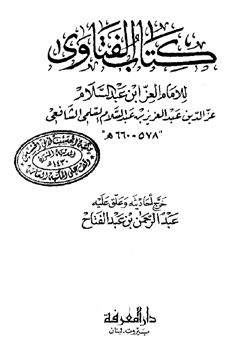 In the Part 4 of this series, we focused on a statement from al-Izz bin Abd al-Salam regarding classification of bidah (innovation) which is used by the innovators to justify their departure from the Sunnah of the Messenger (alayhis salaam) into innovated affairs in matters of worship.
In the Part 4 of this series, we focused on a statement from al-Izz bin Abd al-Salam regarding classification of bidah (innovation) which is used by the innovators to justify their departure from the Sunnah of the Messenger (alayhis salaam) into innovated affairs in matters of worship.
In this article, we will provide a sample of fatawa from al-Izz bin Abd al-Salam (from his book "al-Fatawa" pictured right, Dar al-Ma'rifah, Beirut, 1406H) which will help to establish the following points:
Firstly: That al-Izz bin Abd al-Salam's classification is simply a classification of whatever may enter into the linguistic meaning of bidah (anything which has no prior example and which may be praiseworthy or blameworthy). It is not intended as part of any justification or to be used as a principle for justification of innovation into matters of ibadah (worship) which are not from the Prophetic Sunnah in their foundations, or their details.
Secondly: That al-Izz bin Abd al-Salam shows rejection against the bidah idafiyyah (that which has a foundation in the Shariah from one aspect, but opposes it from others) and encourages following the Sunnah and leaving that which opposes it, and that it is better to follow the Sunnah than to innovate.
Thirdly: That the contemporary innovators who make use of the speech of al-Izz bin Abd al-Salam do injustice to him and twist his words in a way he did not intend them to be used. This can be seen when we look at the general spirit of avoiding and abandoning that which does not agree with the Sunnah or is not founded upon an authentic hadeeth which we see coming across in his fatawa.
Fourthly: Whilst noting importantly that al-Izz was the first to speak of this classification which itself is innovated (as explained by al-Shatibee), and al-Shafi'i himself only spoke of bidah with its linguistic meaning and mentioned it can be blameworthy (what the Shariah intends) or praiseworthy (what enters into matters of public interest or itself has a specific precedence in the Sunnah).
1st Example:
In this first example note how al-Izz is asked about two matters. One that relate to an issue legislated and permitted in the Shariah (shaking hands), and one that relates directly to a matter of worship (raising hands in du'a). There occurs in the book al-Fatawa (pp. 46-47):
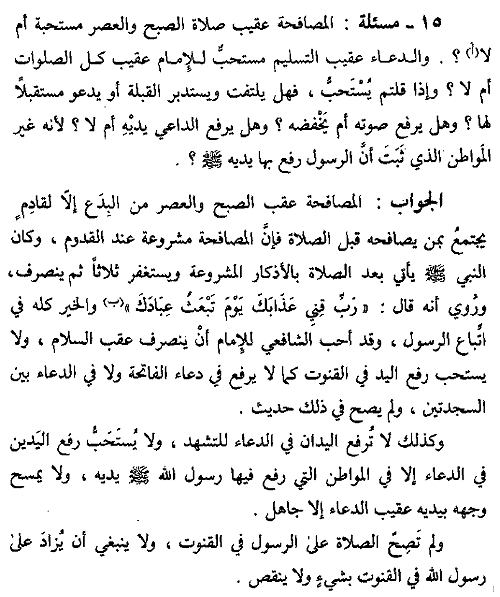
The Issue: shaking hands following the morning and late afternoon prayers, is it recommended (mustahabbah) or not? And supplication after the salutation in every prayer for the Imaam, is it recommended or not? And if you say it is recommended, then should he (the Imam) turn with his back to the qiblah or should he make du'a turning to the qiblah? And should he raise his voice or lower it? And should the one supplicating raise his hands or not? Because this is in other than the places in which it is established that the Prophet (sallallaahu alayhi wasallam) raised his hands?
The Answer: shaking hands following the morning and late afternoon prayers is from the innovations, except for the one who arrives [intending to meet] with the one whom he shakes hands with before the prayer. Shaking hands is legislated when approaching (and meeting someone).
Note how he says that shaking hands after fajr and asr prayers is from the innovations, alongside our knowledge that he included them within the innovations which are mubah (permitted) elsewhere. He states that this practice is from the innovations unless it is between two people whose intent it is to meet, and then when the prayer finishes they shake hands, meaning that this would take it out of being from the innovations, since shaking hands when meeting someone who arrives is a legislated matter. So he distinguished between the two situations
Then he said (speaking about a matter related directly to worship):
The Prophet (sallallaahu alayhi wasallam) used to perform the legislated adhkaar after the prayer, would seek forgiveness three times and then depart. And it is related that he said, "O Lord, save me from the punishment on the day that you resurrect your servants." And all goodness is in making ittibaa' (following) of the Messenger. Al-Shafi'i preferred (loved) that the Imam should depart after the prayer.
It is not recommended to raise the hand in the qunut, just as it is not raised in during the [recitation of] the supplication of al-Fatihah, and nor between the two prostrations, and there is no authentic hadeeth in that regard.
Likewise, the hands are not raised during the supplication of al-tashahhud, and nor is it recommended to raise the hands in supplication except in the situations that the Messenger (sallallaahu alayhi wasallam) raised his hands. No one wipes his face with his hands after the supplication except an ignoramus.
And prayers upon the Messenger in the qunut is not authentic, and it is not desirable that anything should be added into the qunut beyond what the Messenger of Allaah (used to say) and nor anything decreased (from that).
In relation to what is part and parcel of an act of worship we see here that al-Izz mentions all goodness lies in following the Messenger (alayhis salaam) and that one should not add anything into the qunut above what the Messenger used to say, and he mentions that hands should only be raised in those instances in which the Messenger used to raise them. What we are seeing here, as we said, is a general type of spirit regarding matters of worship which is very different to other matters.
2nd Example:
The next question is about making mention the Companions in the sermons which is something the Salaf never did. This occurs in the book al-Fatawa (pp. 47-48):
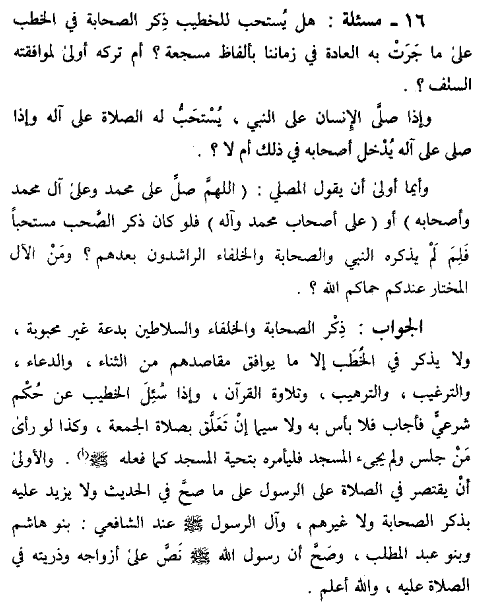
The Issue: Is it recommended for the khatib to mention the Companions in the sermons upon what has become the habit in our times using rhymed prose? Or is abandoning it more befitting due its agreement with [what] the Salaf [were upon]?
And when a man sends prayers upon the Prophet, it is recommended for him to send prayers upon His family, and when he sends prayers upon his family, are his companions entered into that or not?
And which if them is more befitting to be said, "O Allah send prayers upon Muhammad and the family of Muhammad and his companions" or "... upon the companions of Muhammad and his family." And if mention of the companions is recommended then why did not the Prophet, the companios and the rightly-guided caliphs after him mention it? What is the preferred position with you, may Allah protect you?
The Answer: Mentioning the Companions, the rightly-guided caliphs and the rulers is a disliked innovation (bidah ghayr mahbubah), and nothing is to be mentioned in the sermons except what agrees with their objectives such as praise, supplication, exhortation, instilling fear and reading the Qur'an. When he (the khatib) is asked about a Shariah ruling and answers, there is no harm in that, especially if it is in relation to the Jumu'ah prayer. Likewise, (speaking and advising) if he saw someone who came and sat and did not pray the two rakahs for the entering the mosque, as was done by him (sallallaahu alayhi wasallam) . And it is more befitting that sending prayers is restricted to the Messenger, upon what is authentic in the hadeeth, and nothing is to be added to it by mentioning the Companions or other than them. And the family of the Messenger (sallallaahu alayhi wasallam) in the view of al-Shafi'i is Banu Hashim and Banu Abd al-Muttalib. And it is authentic that the Messenger of Allaah (sallallaahu alayhi wasallam) specifically stated his wives and offspring to be included in the sending of the prayers, and Allaah knows best.
From this we can see that what the innovators claim that "Whatever has a basis in the Shariah is not considered the disliked and reprehensible innovation, but is good innovation (bidah hasanah)" is not upon what the Scholars intend. In this example one can argue that remembering the Companions and praising them and respecting them has a basis in the Shariah, and hence to mention them in the sermons is nothing but a bidah hasanah which the Shariah permits. In his answer he clearly states that mentioning the Companions, the rightly-guided caliphs and the rulers is an undesirable innovation, and that only certain things ought be in a sermon (which fulfils the goals and objectives of the sermon). He states that is more befitting that a person only sends prayers upon the Messenger (alayhis salaam) in the manner that is authentically related in the ahaadeeth, and not to add anything further to it. We see here something different to what the innovators argue about "bidah hasanah" which is that if something has a supportor basis in the Shariah then it is a good innovation, not a bad innovation. Applying that argument here would be that mentioning and praising the Companions has a basis in the Shariah (no disagreement there), and since it has a basis in the Shariah, if we were to mention them in the sermons this would be a good bidah (here they have taken something which has a foundation in the Shariah and then altered its form with respect to how it is done). However, we do not see al-Izz bin Abd al-Salam allowing this, and it is clear that he considers this from the undesirable innovations. Again, if you go back and have a look at what al-Izz bin Abd al-Salam includes as examples within his classifications of bidahs that are wajib (obligatory), mandub (recommended) and mubah (permitted), you will clearly see that he intends something different to what the innovators intend by wrongly using his classification to justify innovating into the deen of Allaah that which is not from it. So our point here is that we clearly see a different type of spirit from al-Izz bin Abd al-Salam to what we see from the innovators.
3rd Example:
This next issue is about whether using a bright prayer mat is disliked when one can pray on a normal mat or on the earth, following the Salaf in that. Also when one is absolutely certain that the prayer mat is clean and one is not certain whether the mat in the mosque is pure, is it better to pray on the prayer mat or not, and is it required upon him to know with certainty if the mat in the mosque is pure or not? This is in al-Fatawa (pp. 68-69):
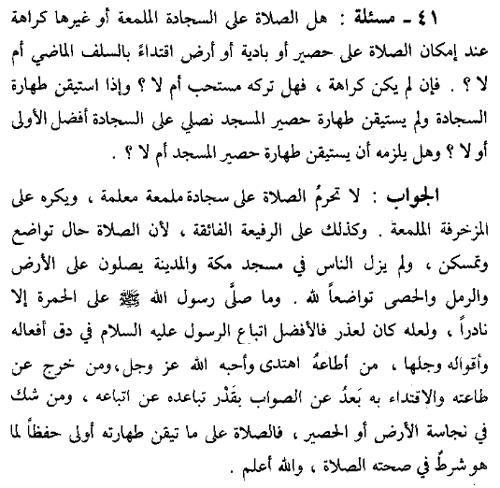
The answer is as follows:
It is not unlawful to pray on a bright and marked prayer mat, but it is disliked upon a bright, adorned one, and likewise upon an exquisite one, because prayer is a state of humility and serenity. The people in the mosque in Makkah and Madinah never ceased to pray upon the earth, sand and pebbles, out of humility to Allaah. And the Messenger (sallallaahu alayhi wasallam) never prayer upon al-humrah (red mat) except rarely, and perhaps that was due to a reason. But it is better to make ittibaa (follow, imitate) the Messenger (alayhis salaam) in the both the minor matters of detail and the major ones from his statements and actions. Whoever obeyed him will be guided and Allaah, the Mighty and Majestic will love him, and whoever departed from obedience to him and guiding himself by him will be distanced from what is correct to the extent of his distance from making ittibaa' of him. And whoever had doubt about the impurity of the earth or the mat, then prayer upon that whose purity he is certain of is more befitting since that is a condition in the validity of the prayer, and Allaah knows best.
We see here that despite what we know of al-Izz's classification into bidah into the five Shariah rulings, he still emphasizes sticking to the way of the Prophet (alayhis salaam) in all matters, large or small, and that when it comes to matters of worship, he clearly entices sticking to the Sunnah and avoiding what opposes it, either in its foundations, or in its particular details.
4th Example:
There occurs in the book al-Fatawa (pp. 69-70):
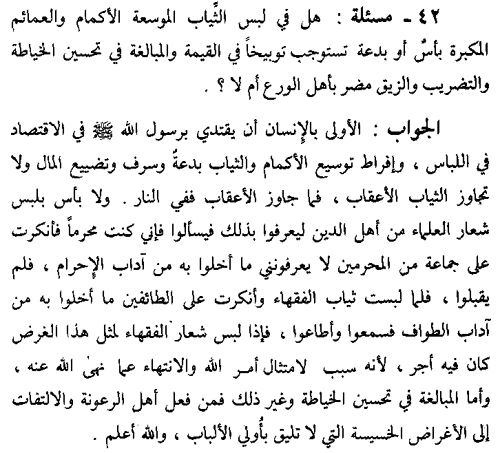
The Issue: In wearing thawbs with widened sleeves and enlarged turbans is there any harm or innovation that necessitates rebuke [in terms of] cost and excessiveness in the beautification of the embroidery, quilting and hems, [is this] harmful upon the people of piety or not?
The Answer: It is more worthy for a person to seek guidance by the Messenger of Allaah (sallallaahu alayhi wasallam) in being moderate in dress. And excessiveness in widening the sleeves and [excessiveness in] the dress is an innovation, and exaggeration and and wastage of wealth. And the thawbs should not go past the ankles, for what is below the ankles is in the Fire...
Note again how he encourages sticking to the Sunnah and seeking guidance by the way of the Messenger (sallallaahu alayhi wasallam) even in matters not directly connected to worship, in this case, widening the sleeves and other such matters, going to excesses in that regard, alongside our knowledge that he actually considers the widening of the sleeves to be an innovation (in the linguistic sense) that is permitted. Once more, we see a general spirit in his answers which indicates the opposition to innovations and enticing sticking to the way of the Messenger (alayhis salaam), even in matters in which he considers elsewhere to be permitted innovations.
5th Example:
There occurs in the book al-Fatawa (p. 100):
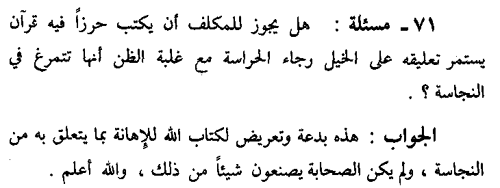
The Issue: Is it permissible for a person to write an amulet consisting of the Qur'an and then hang it around his horses hoping for protection alongside his strong presumption that it will be torn and fall into what is impure?
The Answer: This is a bidah and subjecting the Book of Allaah to belittlement on account of what would be touching it of impurity. The Companions did not used to do anything from that, and Allaah knows best.
Upon the argument of the innovators, one would say that since the Qur'an is known to be a protection, which indeed is a foundation and a basis clearly established in the religion, then one could write it on paper as an amulet with the aim of applying its protective effect to one's animals (livestock or horses). So this would be a "good innovation (bidah hasanah)", because it is being based on something which has a foundation. But we see again an answer from al-Izz, mentioning it in a blameworthy way (as a bidah), in addition to it being a means of subjecting the Qu'ran to belittlement.
6th Example:
There occurs in the book al-Fatawa (pp. 172-173):
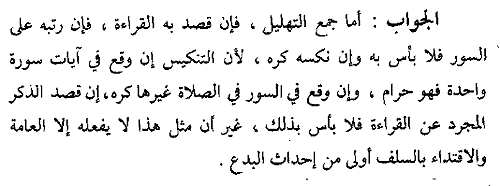
This question is about a man who compiles together all the verses in the Qur'an which contain "laa ilaaha illallaah" and then reads them as he would a surah.
The Answer: As for gathering together all the verses of tahleel, if he intends recitation of them, and arranges them in order of the chapters they come in, then there is no harm, but if he reverses the order, then it is disliked, because reversal of the order, even if it occurs in the verses of a single surah, then it is haram. And if it occurs in the surahs during prayer, it is disliked. If he intends just pure remembrance (dhikr) and not recitation then there is no harm in that, except that the like of this is not done except by the common folk and guiding [oneself] by the Salaf is more befitting that introducing innovations.
This again is clear, note his final remark, and we hardly need to comment on that, and when he says that guiding oneself by the Salaf is more worthy than introducing innovations, he means here innovation (bidah) in worship (ibaadah), and is not speaking about bidah in its general, broad linguistic sense. This indicates to us that the particular perception and understanding in the mind of al-Izz bin Abd al-Salam, is not the same as those innovators of today who try to employ his statement (of classification of bidah into wajib, mandub and mubah) in a way he did not intend at all.
Summing Up
At this point it is worthy that we make sure you understand where we are going here:
Firstly, al-Izz bin Abd al-Salam is an Ash'ari Sufi, upon the creed of the Jahmiyyah in Sifat, and he innovated a five-fold classification of bidah (upon its linguistic sense) rejected by the clear-cut statements of the Messenger (alayhis salaam), and the Companions, who spoke only of bidah in its Shariah sense, and declared that all bidah (in the Shariah sense) is misguidance. But that classification by al-Izz has been used by the innovators to justify their heretical innovations in worship.Secondly, despite this innovated classification, by looking at the specific examples given by al-Izz bin Abd al-Salam of what he includes under his various classifications of bidah (with its linguistic meaning), we can see that they are not referring to matters of worship (ibadah). Please take another look at the beginning of this article and this will be very apparent.
Thirdly, we can see by the sample of his fatwas, that there is completely different spirit to be found in his answers than what is found amongst the innovators who cling to his words (regarding the classification of bidah with its linguistic meaning into five types based upon the ahkaam shar'iah [wajijb, mandub, mubah, makruh, haram]) and try to use them to justify innovations in the matters of worship. This does not appear to be the intent of al-Izz bin Abd al-Salam by what he included as examples in the wajib, mandub and mubah categories, as is apparent in these fatwas.
We are now ready for Part 6 inshaa'Allaah.
Link to this article: Show: HTML Link • Full Link • Short Link
Share or Bookmark this page: You will need to have an account with the selected service in order to post links or bookmark this page.





|
Related Articles:
- Refuting the Notion of Bid'ah Hasanah (Good Innovation) in Worship: Part 8 - Imam Al-Nawawi's Refutation of Contemporary Innovators Trying to Justify Bidah Hasanah in Matters of Worship
- Refuting the Notion of Bid'ah Hasanah (Good Innovation) in Worship: Part 7 - A Diagrammatical Representation of the True and Real Intent of the Shafi'ite Jurists and Unveiling the Deception of the Contemporary Innovators
- Refuting the Notion of Bid'ah Hasanah (Good Innovation) in Worship: Part 6 - Al-Izz Bin Abd Al-Salam's Refutation of a Claimed 'Bidah Hasanah' and Refutation of the Doubts of Contemporary Innovators
- Refuting the Notion of Bid'ah Hasanah (Good Innovation) in Worship: Part 5 - Al-Izz Bin Abd Al-Salam on Adherence to the Sunnah and Avoiding Innovation in Worship
- Refuting the Notion of Bid'ah Hasanah (Good Innovation) in Worship: Part 4 - Al-Izz Bin Abd Al-Salam's Classification of Bid'ah
- Refuting the Notion of Bid'ah Hasanah (Good Innovation) in Worship: Part 3 - the Statements of Imaam Al-Shafi'i
- Refuting the Notion of Bid'ah Hasanah (Good Innovation) in Worship: Part 2 - Understanding Matters of Public Interest (Al-Masalih Al-Mursalah)
- Refuting the Notion of Bid'ah Hasanah (Good Innovation) in Worship: Part 1 - Ibn Hajar Al-Asqalani on the Usage of the Word Bid'ah in Its Linguistic Sense
You must be registered and logged in to comment.
| Key Topics | |
| al-fakihani • al-izz bin abd al-salam • al-masalih al-mursalah • al-maslahah al-mursalah • al-mawlid al-nabawi • al-mawlid-al-nabawi • al-nawawi • al-shaatibee • al-shafi'i • al-shatibi • baatiniyyah • bidah haqiqiyyah • bidah hasanah • bidah idafiyyah • fatimids • funerals • good innovation • hajj • ibn hajar • mawlid • misbahah • mother's day • niyaahah • niyyah • prayer • public interest • qur'an • rosary beads • shaking hands • shiah • sunnah hasanah • tabarruk • talbiyyah • tasbeeh beads • ubaydiyyah • | |



